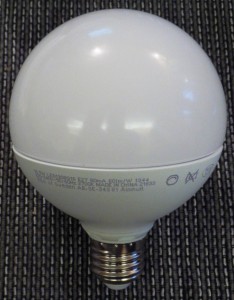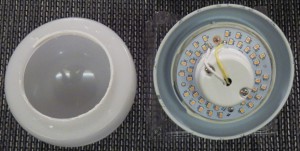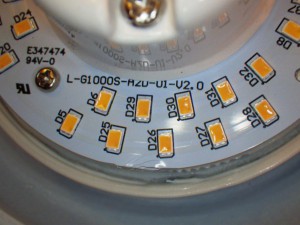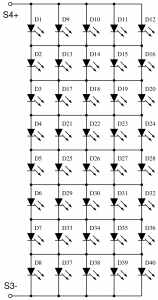Transatlantic recently asked about a new IKEA LED lamp, the LEDARE with 1000 lm.
It comes as a quite big globe (diameter 95 mm) with an E27 socket, an electrical power rating of 16.5 W and is supposed to be dimable!
Transatlantic commented on the high quality of the warm-white light output and wondered if these were still constructed in the same way as the previous LEDARE, which features a combination of white and red LED chips inside.
Now I was able to buy one of these lamps at my local IKEA store in Uppsala, and promptly had a look under the hood.
Again, the LEDARE lamp makes a solid impression from the outside. It is quite heavy because of a strong metal base, which also serves as a heat dissipator. The plastic dome is glued onto the base, underneath you will find a circular array of 80 small, warm-white SMD LEDs. No red LEDs involved. The LEDs are mounted on an aluminum-base circuit board, in 8 parallel groups of 5 LEDs each. All 8 groups are connected into a series string.
The power supply is hidden underneath a metal cap, which I have not opened yet.








That lightbulb is pretty interesting, with 12€ price tag right now, however, not sure it worths the difference with the 600lm model one @7€…
Actually, till end of this month in my ikea there is an offer of 3×2 in the 400Lm model, being 10€ for 3 of them, probably I will stock some for living room lamp (6xE14 holders) 😀
Oh, and I forgot, thanks for all of your reviews!!!
These lamps are not heavy because they are made of metal, but because the filling.
They use a mix of white silicon glue and some sort of fine ceramic powder that fill any void in between the casing and the components.
The circuit most of the time is very cheap and basically used for voltage drop, that’s why the need of head dissipation..
Here in my blog you can see that I have disassemled quite a few of these lamps and I must say that you are wrong in several points:
a) I have not seen a single one yet, which was filled with silicone or any other filler material. The IKEA bulb which I discussed here has a metallic body, which carries the power circuit in a hollow cavity.
b) There are some highly inefficient circuits found in some of the lamps, but most of these are not found in shops here in Europe. You can order these for cheap money directly from China, but I would not recommend to do so, because some of these circuits are just dangerous! The IKEA lamp uses a highly efficient and complex circuit.
c) Heat dissipation is needed, because even the most efficient LEDs currently only convert about 60% of the electrical power into light – the rest is converted into heat – and this is independent of the efficiency of the power circuit. For a 10 W light bulb this would mean that some 4 W of heat need to be removed. This doesn’t sound much, but unlike the high-temperature heat of an incandescent light bulb, this heat must be removed efficiently in order to keep the LED chip at a comparatively low temperature of about 80-100°C.
Most interesting… I can’t wait to see what comes next!
By the way, this lamp is “made in china”, while I thought IKEA had bought an LED factory in India… Strange…